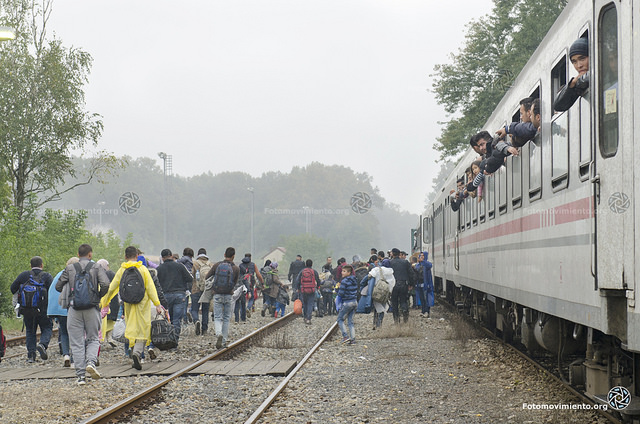By Camille Loubignac
Due to the recent high influx of refugees to the European Union, a number of terms and figures have been (mis)used in the media. “Migrants”, “asylum seekers”, “refugees”, “immigrants”, “illegal migrants”, “stateless persons” are among the many words employed indistinctly by journalists and politicians. However, as illustrated by the recent initiative of Al-Jazeera to proscribe the use of the word “migrant” concerning the individuals involved in the Mediterranean crisis, in favour of the word “refugee”, the use of terms is not anodyne. Words employed relate to lives and human beings. On August 20, 2015, Barry Malone, an Al-Jazeera journalist, explained Al-Jazeera’s decision on his blog: ,“The umbrella term migrant is no longer fit for purpose when it comes to describing the horror unfolding in the Mediterranean. It has evolved from its dictionary definitions into a tool that dehumanises and distances, a blunt pejorative. (…) Migrant is a word that strips suffering people of voice. Substituting refugee for it is – in the smallest way – an attempt to give some back.”
This initiative illustrates the general misunderstanding about the use of terms covering very diverse realities but also tied up with different popular connotations. It is well time to clarify the main (mis)used terms with their definitions.
The paramount point of reference in the field of migrations is the United Nations High Commission for Refugees (UNHCR). According to UNHCR, a migrant is a person who has migrated in another country for over a year. The migrant is an “emigrant” in his country of origin and an “immigrant” in his country of destination. This migrant can migrate for various reasons: economical (searching for better job opportunities), educational (being an exchange student in a foreign university), familial (to join family members), etc. On the other hand, a refugee is “a person who, owing to a well-founded fear of being persecuted for reasons of race, religion, nationality, membership of a particular social group or political opinion, is outside the country of his nationality and is unable or, owing to such fear, is unwilling to avail himself of the protection of that country.”
The term “migrant” tends, in practice, to be employed to refer to voluntary migration, whereas a “refugee” would be considered as a forced migrant from a UNHCR point of view. Further, if this forced migrant is seeking “international protection and [his/her] claims for refugee status have not yet been determined,” s/he is considered as an asylum-seeker. Finally, an internally displaced person (IDP) is a forced migrant leaving his home without crossing any border.
However, this typology shows many lapses, which the media easily plundges into. Indeed, how do we qualify individuals migrating for less than a year? And how do we refer to those individuals who are granted asylum? Do they become “official” refugees? What do they become if their asylum claims fail?
Public speeches misunderstand and misuse terms, because popular understanding connotates these terms and modifies their content. Thus, Al-Jazeera makes a semantic error when deciding to talk only about “refugees” concerning the Mediterranean crisis, as migrants in the Mediterranean may not all be refugees (but rather, for instance, economic migrants searching for better economic opportunities).
Even if Al-Jazeera were to restrict the use of the term “refugees” to specifically refer to those Syrian refugees crossing the Mediterranean Sea, some of these individuals could still be later declined their asylum claims and so would not be referred to as “refugees”; and on a strict juridic view, they never were “refugees”. But as Barry Malone notes, “refugee” does have a better connotation than “migrant”, independently from its dictionary definition and independently from which reality it covers. The matter for Al-Jazeera is not about employing semantically exact words, but to use those words which will trigger the right emotions in people’s minds in order to mobilize political pressure.
Take the example of the word “expatriate”. An expatriate is nothing else than an immigrant, but individuals migrating from developed to developing countries would rather like to call themselves “expatriates”, while they tend to refer to individuals migrating from developing to developed countries by “immigrants”. Even if the word “immigrants” covers the reality of the situation of “expatriates”, the negative connotation attached to it prevents them from using it to qualify themselves.
Al-Jazeera sets a precedent by acknowledging the strong impact of the media’s use of terms and is laudable in its attempt to prevent any discriminatory connotation. It tries to correct a connotation distortion at the expense of dictionary exactitude.
In the short term, this solution is beneficial, for the term “refugee” will carry more sympathy and emotion from readers than the term “migrant”. However, connotations attached to words rest in the populations’ sentiments regarding these corresponding realities: the negative connotations attached to the word “migrant” and “immigrant” is only a consequence of the anti-migrants sentiments of hosting countries’ populations. Therefore, in the long term popular connotations could continue hampering any word used to cover the reality of Syrian refugees’ fleeing, eventually turning the undertone of the word “refugee” to a negative one. As long as this underlying negative sentiment towards migration will endure, any term employed will continue to be linked to negative connotations.
News agencies like Al-Jazeera will have to employ new terms again and again to incite positive emotions from their readers in the face of an overarching adverse atmosphere.
Featured image credit: Fotomovimiento, Flickr CC. License can be found here.
Inserted image credit: Peter Tkac, Flickr CC. License can be found here.


